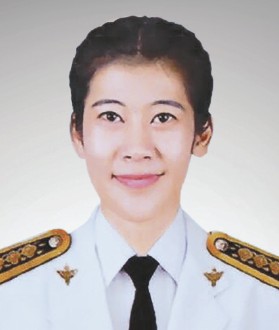Parental View of Palliative Care in Children with Cancer: Integrative Review
Main Article Content
Abstract
The purpose of this integrative review is to describe parents’ views and needs whenit comes to palliative care in children with cancer at this critical phase. Ten publishedstudies of a literature search in PubMed, Science Direct and CINAHL were included inthis review. The analysis resulted in six themes: 1) good information and understandingof palliative care; 2) support by specialists in pediatric oncology; 3) respect as aknowledgeable expert; 4) emotional and psychological support; 5) effective communicationand 6) roles of actions. Professional nurses and health care professional teams shouldbe concerned about parents’ views and the need for palliative care for their children withcancer. They should also understand the child and their parents as the center ofindividual care. Further studies need to be performed in this area.
Article Details

This work is licensed under a Creative Commons Attribution-NonCommercial-NoDerivatives 4.0 International License.
This is an open access article distributed under the terms of the Creative Commons Attribution Licence, which permits unrestricted use, distribution, and reproduction in any medium, provided the original work is properly cited.
References
2. Akard TF, Gilmer MJ, Friedman DL, et al. From qualitativework to intervention development in pediatric oncologypalliative care research. J Pediatr Oncol Nurs 2013;30(3):153-60.
3. Coyne I, Amory A, Kiernan G, et al. Children’s participationin shared decision-making: Children, adolescents, parents andhealthcare professionals’ perspectives and experiences.Eur J Oncol Nurs 2014;18(3):273-80.
4. Jones MB. A guide for hope: A psychoeducational programfor family caregivers of newly diagnosed stage IV coloncancer patients: The Chicago School of ProfessionalPsychology; 2007.
5. Ward E, DeSantis C, Robbins A, et al. Childhood and adolescentcancer statistics, 2014. CA Cancer J Clin 2014;64(2):83-103.
6. Wolfe J, Hinds P, Sourkes B. Textbook of InterdisciplinaryPediatric Palliative Care E-Book: Expert Consult PremiumEdition: Elsevier Health Sciences; 2011.
7. Melin-Johansson C, Axelsson I, Grundberg MJ, et al. Whena child dies: Parents’ experiences of palliative care-anintegrative literature review. J Pediatr Nurs 2014;29(6):660-9.
8. Zaider TI, Salley CG, Terry R, et al. Parenting challenges inthe setting of terminal illness: a family-focused perspective.Curr Opin Support Palliat Care 2015;9(1):52-7.
9. Dolgin MJ, Phipps S, Fairclough DL, et al. Trajectories ofadjustment in mothers of children with newly diagnosedcancer: a natural history investigation. J Pediatr Psychol2007;32(7):771-82.
10. Ernst JC, Beierlein V, Romer G, et al. Use and need forpsychosocial support in cancer patients. Cancer2013;119(12):2333-41.
11. Rodriguez EM, Dunn MJ, Zuckerman T, et al. Cancer-relatedsources of stress for children with cancer and their parents.J Pediatr Psychol 2011;37(2):185-97.
12. Crespo C, Santos S, Tavares A, et al. “Care that matters”:Family-centered care, caregiving burden, and adaptation inparents of children with cancer. Fam Syst Health 2016;34(1):31-40.
13. Klassen AF, Klaassen R, Dix D, et al. Impact of caring for achild with cancer on parents’ health-related quality of life.J Clin Oncol 2008;26(36):5884-9.
14. Aschenbrenner AP, Winters JM, Belknap RA. Integrativereview: parent perspectives on care of their child at the endof life. J Pediatr Nurs 2012;27(5):514-22.
15. Machi LA, McEvoy BT. The literature review, six steps tosuccess. 2009. (Accessed April 19, 2017, at https://www.csbsju.edu/Documents/Libraries/Minutes/Literature%20Review.pdf.).
16. Konrad SC. Mothers’ perspectives on qualities of care in theirrelationships with health care professionals: The influence ofrelational and communicative competencies. J Soc Work EndLife Palliat Care 2008;4(1):38-56.
17. Monterosso L, Kristjanson L, Phillips M. The supportive andpalliative care needs of Australian families of children whodie from cancer. Palliat Med 2009;23(6):526-36.
18. Neilson SJ, Gibson F, Greenfield SM. Pediatric oncologypalliative care: experiences of general practitioners andbereaved parents. J Palliat Care Med 2015;5(2):214.
19. Seth T. Communication to pediatric cancer patients and theirfamilies: A cultural perspective. Indian J Palliat Care2010;16(1):26-9.
20. Kars MC, Grypdonck MH, de Bock LC, et al. The parents’ability to attend to the “voice of their child” with incurablecancer during the palliative phase. Health Psychol2015;34(4):446-52.
21. Arruda-Colli M, Perina E, Santos M. Experiences of Brazilianchildren and family caregivers facing the recurrence of cancer.Eur J Oncol Nurs 2015;19(5):458-64.
22. Robert R, Zhukovsky DS, Mauricio R, et al. Bereaved parents’perspectives on pediatric palliative care. J Soc Work End LifePalliat Care 2012;8(4):316-38.
23. Boss RD, Hutton N, Griffin PL, et al. Novel legislation forpediatric advance directives: Surveys and focus groups captureparent and clinician perspectives. Palliat Med 2015;29(4):346-53.
24. Weidner NJ, Cameron M, Lee RC, et al. End-of-life care forthe dying child: What matters most to parents. J Palliat Care2011;27(4):279-86.


